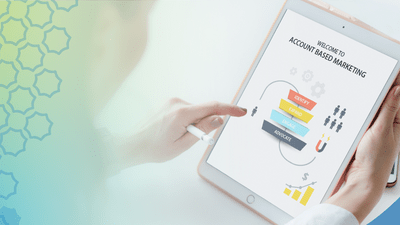Top Strategies for Effective Marketing Automation for B2B

- Marketing automation for B2B organizations boosts your productivity by handling repetitive tasks.
- Smart data collection, lead scoring, and segmentation form the backbone of effective automation, they're what turn scattered efforts into targeted campaigns that actually convert.
- Audience segmentation, in particular, helps create curated content that grabs customer attention and drives engagement.
- B2B marketing automation can improve team productivity while expanding marketing efforts.
- You still need human oversight to keep your brand authentic and ensure automation enhances (rather than replaces) real customer connections.
What if you could turn your scattered marketing tasks into a revenue-generating machine that works 24/7?
You're drowning in manual processes, chasing leads that go cold, and watching competitors pull ahead while you're stuck sending one-off emails. The promise of marketing automation, with McKinsey reporting that it drive 5–15% revenue growth and a 10–20% boost in sales productivity, feels real, but where do you start?
Automating your marketing tasks can help you keep your pipeline full while freeing up valuable time for other activities. How ready is your organization and people to transform those time-consuming tasks into strategic growth drivers?
Understanding B2B Marketing Automation
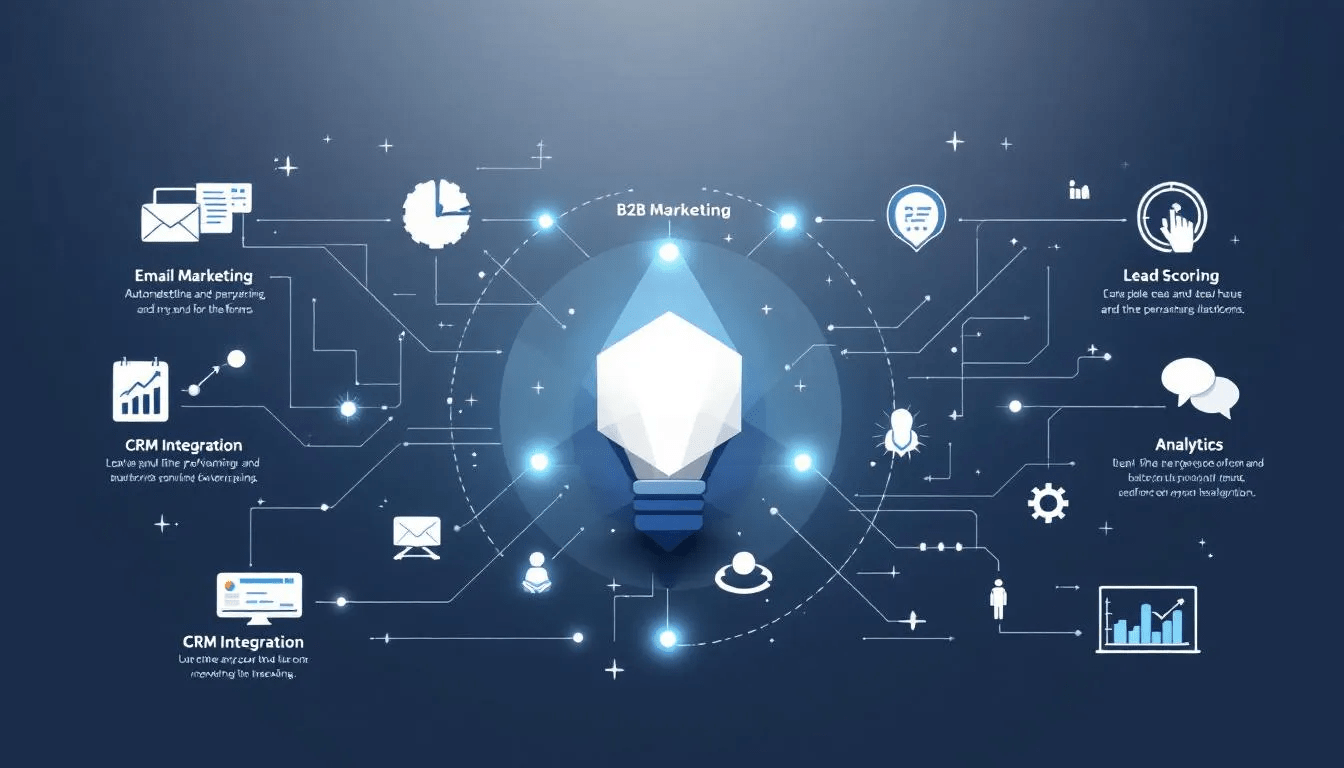
B2B marketing automation means using smart tools and software to streamline your marketing efforts when you’re targeting other businesses as customers.
Unlike B2C marketing that goes after individual consumers, B2B marketing is all about engaging companies as your clients.
You’re essentially informing potential business partners about products or services that’ll improve their operations, making it highly strategic and data-driven. Smart B2B marketers use B2B marketing automation platforms to maximize their effectiveness.
Here’s what you’re really after: increased productivity and extended campaign reach. You’ll use automation tools to manage email marketing, lead nurturing, and engage prospects across multiple channels for ongoing customer engagement. Email marketing automation is a key feature of marketing automation platforms, enabling the creation of automated email workflows that nurture leads and improve campaign efficiency.
Automation software lets marketers automate repetitive, time-consuming tasks, saving hours weekly. When done right, automated email campaigns drive sign-ups and boost revenue by addressing specific business pain points.
These tools also improve customer experience and ensure your ads reach the right people at the perfect moment. B2B marketing automation can streamline entire marketing campaigns, making them more efficient and impactful.
B2B marketing automation focuses on education over personalization, and that’s key. While B2C often relies on ultra-personalized content, you’ll prioritize educating leads and partners about your value propositions.
This approach aligns perfectly with typically longer, more predictable B2B sales cycles, ensuring potential customers understand your offering before they’re ready to buy.
Inbound marketing strategies, such as content-driven approaches, are widely used in B2B marketing automation to attract, engage, and nurture leads. These methods help generate interest, build relationships, and support lead management throughout the sales funnel.
Key Benefits of B2B Marketing Automation
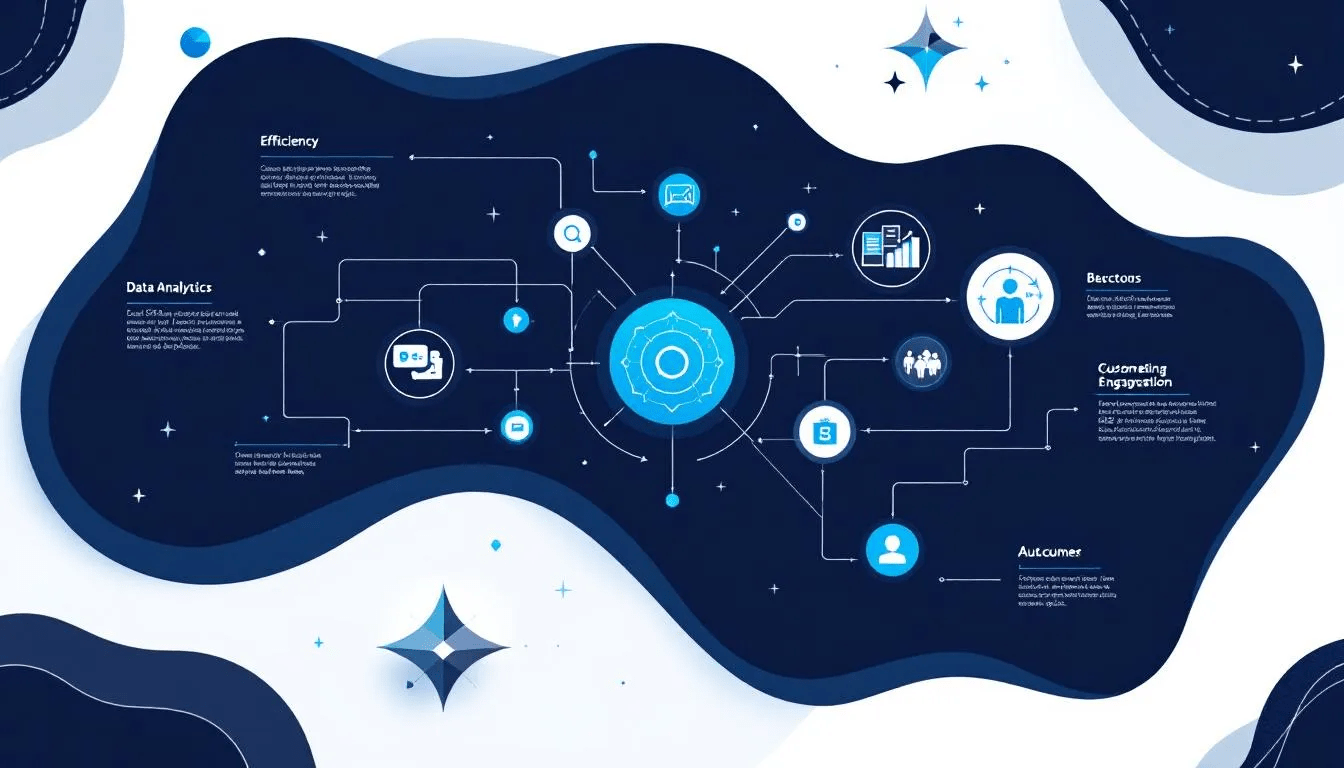
The benefits you’ll see from an effective B2B go-to-market strategy and marketing automation are game-changing:
Time savings hit you immediately. You’ll automate repetitive tasks like email campaigns and lead nurturing, saving considerable hours each week.
Automated workflows become self-sufficient once configured, translating to significant time savings. This frees up your marketing team to focus on strategic activities that actually move the needle.
Your productivity gets a massive boost through increased efficiency. You’ll ensure potential customers receive consistent follow-ups, keeping them engaged throughout your sales cycle without manual intervention.
Cost reduction becomes substantial, especially if you’re a small business. Key advantages include:
- Small businesses can compete with larger enterprises by slashing expenses from manual marketing efforts.
- Businesses report an average 12.2% reduction in marketing costs after implementing automation tools.
- You’ll generate qualified leads more effectively, often seeing dramatic increases in lead volume.
- Some companies report up to a 451% surge in lead volume.
- Marketing automation has been shown to drive a 14.5% increase in sales productivity.
Bottom line: B2B marketing automation enhances your overall business efficiency and sales performance. By automating lead nurturing processes, you’ll convert more leads into sales opportunities, leading to higher conversions and revenue.
This improvement comes from data-driven insights into consumer behavior, allowing for more personalized and effective marketing strategies. With automation, you can personalize marketing messages and customer interactions based on individual prospect or customer data, which helps improve engagement and conversion rates.
Essential Components of a B2B Marketing Automation Strategy
A robust B2B marketing automation strategy is built on several essential components, starting with data collection. Effective marketing automation relies on accurate data from various sources, including:
- Website analytics
- CRM systems
- Social media platforms
- Third-party providers
This data forms the backbone of all automation efforts, enabling precise targeting and personalized emails communication.
Lead scoring is another critical component, helping marketing and sales teams prioritize high-quality leads based on their potential value within the sales funnel.
By assigning scores to leads based on their behavior and engagement, companies can focus their resources on the most promising prospects. Marketing automation can help improve lead scoring by providing automatic triggers to update scores.
Similarly, segmentation involves grouping leads into different categories, such as industry, company size, and behavior, to tailor messaging and improve engagement.
Automation rules and lead nurturing processes are fundamental to any B2B marketing automation strategy. These rules dictate how and when automated actions should be triggered, ensuring a seamless and efficient marketing process to nurture leads and nurture leads.
A lead nurture campaign is an automated, personalized campaign that marketers use to convince prospects to purchase.
Account-based marketing efforts, which target specific high-value accounts with personalized campaigns, also play a significant role in maximizing the effectiveness of marketing automation.
Data Quality and Integration in B2B Marketing Automation
In the world of B2B marketing automation, data quality and integration are the unsung heroes behind every successful campaign. High-quality data is the fuel that powers your marketing automation platform, enabling you to accurately segment audiences, score leads, and nurture them through the sales funnel. When your data is clean, current, and comprehensive, your marketing and sales teams can make informed decisions that drive real results.
But data alone isn’t enough—seamless integration is just as critical. By connecting your marketing automation tools with third-party systems like CRM platforms, you create a unified view of the customer journey. This integration helps marketing and sales teams keep track of every interaction, ensuring that no lead falls through the cracks and that every customer receives a consistent, personalized experience.
For B2B businesses, prioritizing data quality and integration means you can automate more effectively, nurture leads with greater precision, and create campaigns that truly resonate. It also helps break down silos between marketing and sales, making it easier to collaborate and share insights in real time. Ultimately, focusing on data quality and integration helps businesses maximize the impact of their marketing automation efforts, drive sustainable growth, and deliver the kind of personalized experiences that turn leads into loyal customers.
Account Based Marketing in B2B Automation
Account-based marketing (ABM) has become your secret weapon if you're running B2B campaigns and want to squeeze every drop of value from your marketing automation.
Think of traditional marketing like casting a wide net—you're hoping to catch something good. ABM? That's more like spear fishing. You're targeting those high-value accounts with laser precision, delivering experiences that make key decision-makers think, "Finally, someone gets us."
Here's where marketing automation software becomes your best friend. It helps you spot and rank your dream accounts, so every marketing move you make hits exactly where it counts.
With B2B marketing automation, you can set up systems that create and deliver content that actually matters to each account. Your marketing team can nurture leads with campaigns that feel personal (because they are), boosting engagement and conversion rates that'll make your CFO smile.
Automation takes the headache out of juggling multiple account-based campaigns. You'll track interactions and see results as they happen—no more guessing games.
The ABM playbook breaks down into three moves: pick your high-value targets, craft content that speaks their language, and automate campaigns that guide leads through your sales process like a GPS.
When you automate these steps, you're free to focus your energy on accounts that'll actually move the revenue needle. Your marketing and sales teams finally work in harmony instead of pointing fingers.
Bottom line? Account-based marketing in B2B automation helps you build relationships that stick with your most valuable accounts, deliver content that resonates, and turn leads into sales faster than you thought possible.
To see this in action, check out two healthcare-focused ABM campaigns that illustrate how tailored automation drives results.
Major Health Systems ABM Campaign Case Study
O8 crafted a laser-focused ABM campaign for a technology client who was breaking into healthcare—and we're talking about targeting just the top 10 high-value health system accounts that really mattered.
We built three distinct message segments, created custom landing pages that spoke directly to each audience, launched LinkedIn and Google ads, and developed tailored email plus LinkedIn sequences that actually resonated. Then we set up automated nurturing workflows to keep the conversation going—all while navigating strict regulatory constraints and working against some pretty tight deadlines.
Here's the thing: O8 couldn't access the client's internal systems because of firewall rules, but we collaborated closely with their sales team and delivered detailed documentation so they could implement and track everything seamlessly. The result? A coordinated, high-impact ABM play that converted those key accounts efficiently.
Healthcare SaaS startup ABM + Digital Marketing Support Case Study
For Mednition, a growth-stage healthcare SaaS startup, O8 delivered full-spectrum digital marketing support—we're talking UX improvements, SEO, content strategy, lead nurture, plus trade-show and ABM support all working together.
This integrated approach delivered experiential ABM touchpoints (think dimensional mailers that actually got opened), aligned messaging with sales enablement, and supported long-term nurturing workflows that kept prospects engaged. The tailored strategy helped the startup build pipeline efficiently while hitting their conversion goals.
Customer Journey Mapping for Automated Campaigns
You know what separates successful marketing campaigns from the ones that fall flat? Understanding exactly where your customers are in their journey.
Customer journey mapping lets you visualize every single step a potential customer takes. From that first moment they discover you to the final purchase—and you'll spot the key touchpoints where engagement can really take off.
Here's where it gets interesting: when you integrate marketing automation software into this process, you're designing campaigns that deliver the right message at exactly the right time. Each stage of the journey gets its own tailored approach.
With marketing automation, you can automate personalized content and messaging that aligns perfectly with each milestone. Your leads get relevant information and nurturing as they move through your sales funnel.
This means higher conversion rates because you're speaking to them when they're ready to listen.
Automated campaigns trigger based on specific actions or behaviors. Someone downloads your whitepaper? They get a follow-up sequence. They attend your webinar? Different track entirely.
You're engaging in real-time and creating that seamless experience customers expect.
Creating your customer journey map starts with identifying the critical stages and interactions that define your customers' path to purchase. Once you've mapped these out, your marketing team can use automation to create targeted campaigns.
Each campaign addresses the unique needs and questions customers have at that specific stage. You're not just nurturing leads more effectively—you're building trust and loyalty.
Consistent, personalized experiences throughout the entire journey? That's how you stand out.
When you use marketing automation software to map and automate the customer journey, every interaction becomes meaningful and timely. You're designing each touchpoint to move leads closer to a sale.
This strategy helps you stand out in a crowded market, improve customer satisfaction, and drive the kind of long-term growth that actually sticks.
Lead Nurturing and Scoring Strategies
Want to turn more leads into customers? You'll need solid lead nurturing and scoring strategies at the heart of your B2B marketing automation.
Lead nurturing means delivering targeted content and personalized experiences that guide your prospects through the sales funnel. It keeps them engaged and informed at every single stage.
It's all about cultivating leads who aren't customers yet—but you know they're getting close. With marketing automation software, you can automate these nurturing campaigns. You'll provide timely, relevant information that addresses each lead's specific needs and interests.
Lead scoring? That's your secret weapon for prioritizing leads based on how likely they are to convert. You assign scores to leads based on what they do—opening emails, downloading resources, attending events—plus their demographic info. This way, your marketing and sales teams can focus their efforts on the most qualified leads.
Here's the thing: when you give leads information and answer their questions, you'll shorten the sales cycle and convert more leads into buyers. Automated lead scoring ensures you won't miss any opportunities. Your sales team will always work with the most promising prospects.
When you combine automated lead nurturing with robust lead scoring strategies, you create a seamless, efficient process for moving leads through your sales funnel.
Marketing automation software keeps track of every interaction. It automatically updates lead scores and triggers personalized nurturing campaigns based on real-time data.
This approach doesn't just increase your chances of converting leads into customers—it ensures your marketing efforts focus where they'll have the greatest impact.
By using B2B marketing automation to nurture leads and implement effective scoring strategies, you'll deliver more personalized experiences, improve lead quality, and drive higher sales performance.
Personalization and Customer Experience in B2B Automation
What if your prospects actually looked forward to your emails? Personalization isn't just marketing fluff—it's the difference between inbox deletion and genuine engagement. Today's B2B buyers are drowning in generic pitches, so they're craving content that speaks directly to their specific challenges.
You can leverage data and analytics to deliver emails, content, and experiences that actually matter to your audience. It's like having a conversation instead of broadcasting through a megaphone. Marketing automation platforms make this possible at scale.
Smart B2B businesses use customer data to segment audiences and send the right message at exactly the right moment. This approach doesn't just boost engagement—it builds real trust. And trust? That's what turns skeptical prospects into loyal customers who stick around.
Here's the thing: personalized experiences help you address each customer's unique pain points and goals. You're creating genuine human connections, not just pushing products. When you nail this, you'll stand out in a crowded market and build relationships that fuel long-term growth.
Content and Engagement Strategies for B2B Marketing Automation
Your content needs to do more than just exist—it should educate, inform, and yes, even entertain your audience. Think of it like feeding prospects exactly what they need at each stage of their buying journey.
Blog posts, whitepapers, webinars, case studies—you need this diverse mix to attract and nurture leads effectively.
But great content without smart engagement is like having a Ferrari with no gas. You need strategies like social media marketing, targeted email campaigns, and account-based marketing to build relationships and stay top-of-mind.
Marketing automation tools help you deliver the perfect content to the right person when they're most ready to receive it.
Automation also tracks every customer interaction and behavior, so you can refine your approach continuously. It's like having a crystal ball that shows you what's working and what isn't. You'll streamline your efforts while nurturing leads more effectively than ever before.
The bottom line? A solid content and engagement strategy powered by marketing automation helps you engage, nurture, and convert leads seamlessly. You're not just driving growth—you're building relationships that last.
Sales and Marketing Alignment for Automation Success
Want to unlock marketing automation's full potential? Get your sales and marketing teams singing from the same songbook. When these teams align their goals, strategies, and data, magic happens—you create seamless customer experiences that drive better results across the board.
Marketing automation platforms become the bridge between these teams by providing real-time access to customer data, lead activity, and engagement history. Sales teams can prioritize high-quality leads and engage prospects with personalized outreach that actually resonates. No more shooting in the dark.
Meanwhile, marketing teams use automation to nurture leads and deliver targeted content that supports the sales process perfectly. It's like having two gears that finally mesh together smoothly. You'll streamline lead generation, improve nurturing, and boost conversion rates while saving time and resources.
When sales and marketing collaborate through marketing automation, your business stays agile and competitive in today's fast-moving market. The result? More qualified leads, higher sales, and customer experiences that set you apart from everyone else.
Leveraging AI in B2B Marketing Automation
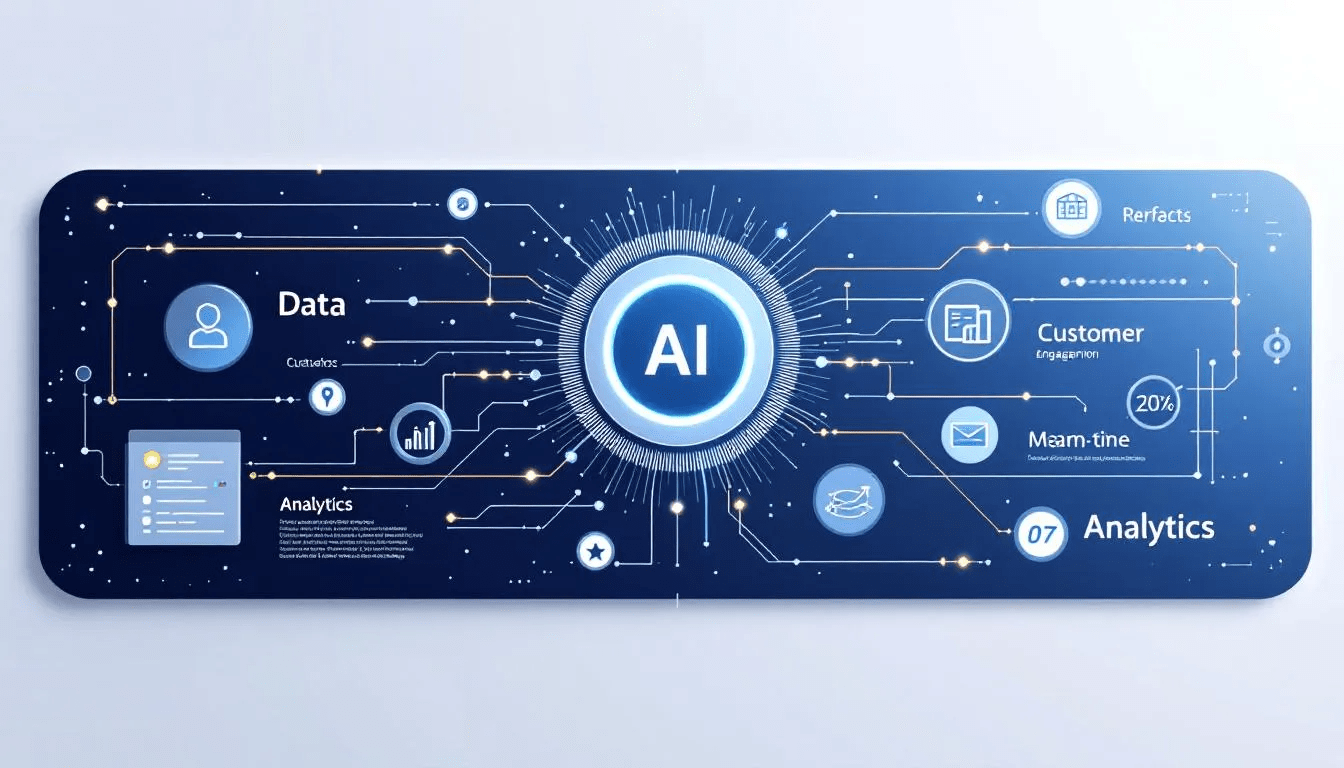
Artificial Intelligence (AI) is revolutionizing B2B marketing automation by:
- Enhancing decision-making and campaign management.
- Analyzing vast amounts of data to automate and optimize marketing efforts.
- Delivering highly personalized experiences at scale.
Predictive lead scoring stands out as one of AI's most powerful tools—it pinpoints your best prospects using historical engagement data. Think of it like having a crystal ball that actually works.
AI also transforms your email marketing by tailoring content to each subscriber's behavior. This means better engagement across the board. For instance, AI personalizes email content based on what people have done before, so each recipient gets relevant, timely information that actually matters to them.
This personalization creates stronger connections with potential customers and boosts your conversion rates. Automated email workflows keep communication flowing at just the right moments, so you're always engaging prospects when it counts.
Chatbots and virtual assistants are emerging as game-changing trends in AI-driven marketing automation—they streamline customer support and engagement like never before. These tools give real-time responses to customer questions, which dramatically improves the overall experience you're delivering.
AI-powered dynamic pricing takes things even further by adjusting product prices based on market trends and customer behavior. This approach optimizes your revenue generation in ways that would be impossible to manage manually.
Ready to streamline your marketing and boost your productivity?
Explore how our Marketing Automation Services can help.
Best Practices for Implementing Marketing Automation Tools
To implement marketing automation tools effectively, you need a clearly defined marketing strategy. Additionally, a commitment to continuous improvement is essential.
One of the best practices is to adopt a ‘strategy before software’ approach, ensuring that the chosen tools align with the overall marketing objectives.
This strategic alignment is crucial for achieving significant business transformations and maximizing the benefits of automation. Integrating marketing automation with CRM systems provides a holistic view of the customer journey.
User training is another critical factor in successful implementation. Investing in training programs empowers marketing and sales teams to make the most of automation tools, enhancing their capabilities and performance.
This training should cover not only the technical aspects but also ethical guidelines to ensure that automation practices align with corporate values and societal expectations, including the sales team.
Continuous improvement involves regularly reviewing and updating marketing strategies to keep pace with the evolving landscape of marketing automation. This proactive approach helps businesses adapt to new trends and technologies, ensuring that their automation efforts remain effective and relevant.
Examples of Successful B2B Marketing Automation
Several companies have successfully implemented B2B marketing automation software, achieving remarkable results. For instance, SmartBear experienced a 200% increase in lead volume through email automation.
Additionally, businesses leveraging marketing automation for prospect nurturing have seen a 451% increase in qualified leads, highlighting the effectiveness of automated lead nurturing strategies.
Copa Airlines is another success story, having boosted their revenue by 14% using marketing automation tools.
These examples highlight the tangible benefits of adopting automation, from improved lead generation and nurturing to significant revenue gains. They serve as inspiration for other B2B businesses looking to enhance their marketing efforts and achieve similar results.
Choosing the Right Marketing Automation Platform
Selecting the right marketing automation platform is crucial for achieving desired outcomes. Businesses need to ensure the platform they choose aligns with their specific business needs, including features that support their unique goals and operational requirements.
Marketing automation provides automated, in-depth analytics and reports on leads and campaigns, offering valuable insights for decision-making. Evaluating unique marketing requirements is essential, and factors like platform features, scalability, and flexibility should be taken into account.
For instance, HubSpot is favored for its comprehensive ecosystem that integrates marketing, sales, and customer service, making it a versatile choice for many businesses.
For larger enterprises with complex sales cycles, Marketo stands out due to its robust lead management and advanced automation features. On the other hand, Pardot is ideal for B2B companies already using Salesforce, offering seamless integration and powerful tools for managing intricate sales processes.
For newcomers or small businesses, Mailchimp provides a user-friendly interface and cost-effective options, including free tiers. Another consideration is the platform’s ability to integrate with existing systems, such as CRM software, to create a unified view of customer interactions.
This integration enhances collaboration between marketing and sales teams and ensures a seamless data flow, ultimately improving the efficacy of marketing efforts.
Common Pitfalls and How to Avoid Them
Despite its many benefits, marketing automation can present challenges if not implemented correctly. One common pitfall is maintaining inaccurate data, which can lead to inefficient resource use and poor marketing results.
To avoid this, businesses should prioritize data accuracy and ensure proper system integrations to prevent data silos and workflow disruptions. Maintaining data hygiene ensures the effectiveness of marketing automation.
Another issue is automating flawed processes, which can exacerbate existing inefficiencies. It is essential to address and fix any inefficiencies before implementing automation. Additionally, over-reliance on mass campaigns can negatively impact engagement, highlighting the need for personalized messaging.
Regularly tracking and analyzing key performance metrics can help businesses keep track of and rectify any issues, ensuring a higher ROI and more effective marketing strategies.
The Role of Human Oversight in Marketing Automation
While automation offers numerous advantages, human oversight remains crucial in maintaining brand integrity and customer trust. AI, though powerful, lacks the emotional understanding and contextual awareness that human marketers bring to the table.
This oversight ensures that AI-driven personalization feels genuine and not manipulative, fostering stronger customer relationships.
Balancing automation with a human touch is essential for complex interactions, where a personal approach can significantly enhance the customer experience.
By keeping humans involved in the automation process, businesses can ensure that their marketing efforts remain authentic and aligned with their brand values.
Measuring the Success of Your B2B Marketing Automation Efforts
Measuring the success of B2B marketing automation efforts requires establishing clear KPIs and metrics that align with business objectives. These indicators provide valuable insights into the efficiency and effectiveness of marketing campaigns, helping businesses understand why leads convert or fail to convert.
Regular reporting on these metrics is crucial for optimizing automation initiatives and improving overall marketing performance.
A data-driven approach is essential for evaluating the impact of marketing automation. By analyzing multi-channel engagement data, businesses can gain a deeper understanding of customer preferences and behaviors, allowing for more targeted and effective marketing strategies.
This continuous analysis and optimization process ensures that automation efforts yield the best possible results.
Future Trends in B2B Marketing Automation
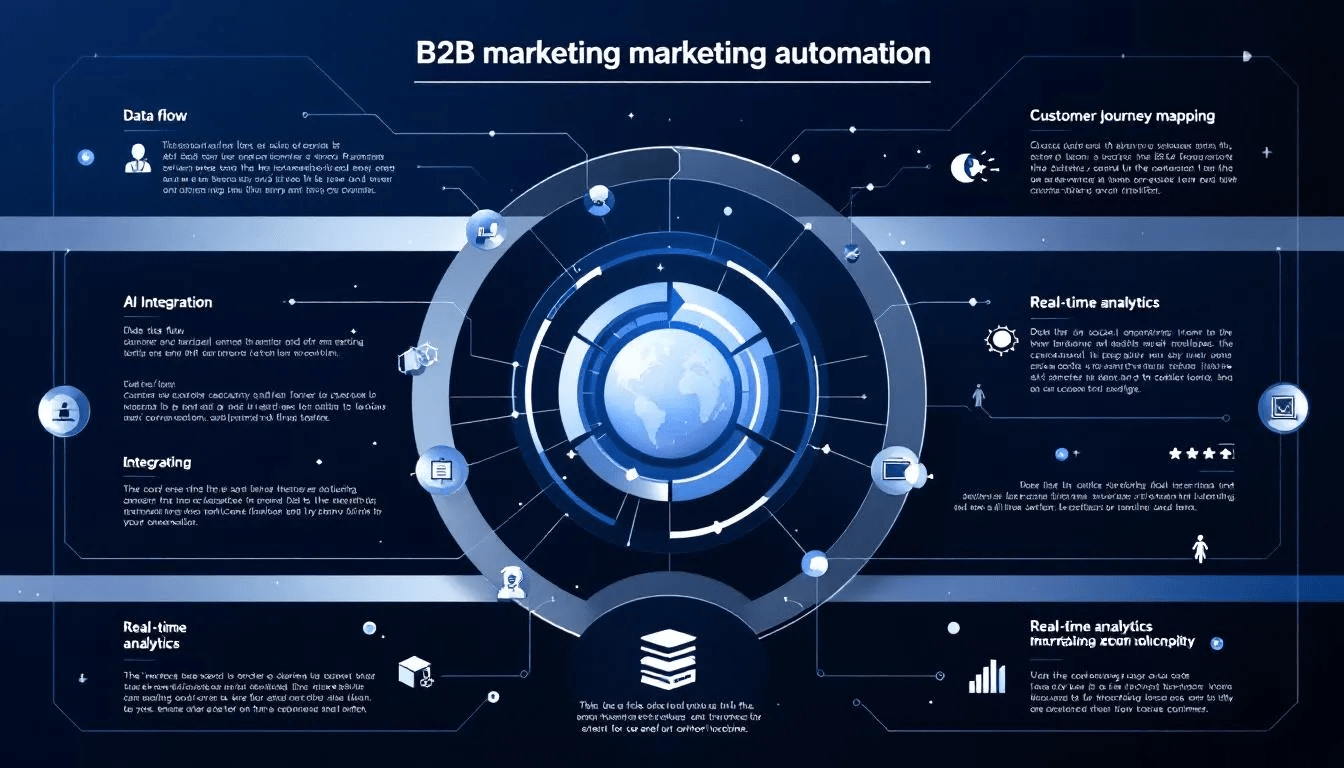
The future of B2B marketing automation is closely tied to advancements in AI and machine learning. These technologies are set to enhance automation capabilities, enabling businesses to achieve higher efficiency and more precise customer targeting.
Emerging trends include the integration of machine learning algorithms to optimize campaign performance through predictive analytics and a better understanding of consumer behavior.
New automation tools that integrate seamlessly with existing systems will also play a significant role in the future. This convergence of AI applications and innovative tool is poised to redefine B2B marketing strategies, leading to significantly improved outcomes for businesses.
As these technologies continue to evolve, businesses must stay informed and adaptable to maintain a competitive edge.
Conclusions
In summary, B2B marketing automation offers a plethora of benefits, from time savings and cost reductions to improved lead generation and higher conversions.
By understanding its essential components, leveraging AI, and following best practices, businesses can maximize the impact of their marketing efforts. Successful examples from companies like SmartBear and Copa Airlines illustrate the tangible results that can be achieved through effective automation.
Moving forward, businesses must stay informed about emerging trends and continuously refine their strategies to keep pace with technological advancements.
By balancing automation with human oversight, setting clear KPIs, and choosing the right platforms, companies can ensure their marketing automation efforts drive sustainable growth and success.
Frequently Asked Questions
What is B2B marketing automation?
B2B marketing automation refers to the utilization of tools and software to optimize marketing strategies aimed at other businesses, thereby increasing efficiency and improving customer engagement. This approach allows for more effective management of marketing tasks and better targeting of business clients.
How can marketing automation benefit small businesses?
Marketing automation benefits small businesses by saving time and reducing costs, enabling them to compete more effectively with larger enterprises through the automation of repetitive tasks and enhanced lead generation. Implementing such tools can significantly streamline operations for small businesses.
What are some common pitfalls in marketing automation?
Common pitfalls in marketing automation include maintaining inaccurate data, automating flawed processes, and over-reliance on mass campaigns. To avoid these issues, it is crucial to ensure accurate data management and proper system integrations.
Why is human oversight important in marketing automation?
Human oversight is crucial in marketing automation to ensure AI-driven personalization feels authentic and upholds brand integrity, which fosters customer trust and enhances the overall customer experience.
What future trends should we expect in B2B marketing automation?
You should expect that future trends in B2B marketing automation will be driven by advancements in AI and machine learning, leading to enhanced automation capabilities and improved campaign performance. This integration will facilitate seamless interactions with existing systems.






